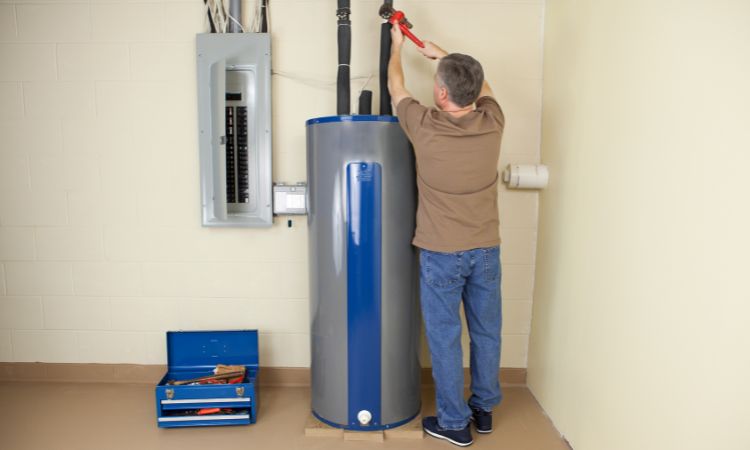Spotting Common Heater Problems
Spotting Common Heater Problems
Blog Article
This post following next relating to Water Heaters Problems is indeed insightful. You should read it.

Picture beginning your day without your regular warm shower. That currently sets a bad tone for the remainder of your day.
Every residence requires a dependable water heater, however just a few understand exactly how to handle one. One very easy means to maintain your hot water heater in top shape is to look for faults frequently as well as fix them as soon as they appear.
Remember to switch off your hot water heater before sniffing around for mistakes. These are the water heater faults you are more than likely to come across.
Water as well hot or also cold
Every hot water heater has a thermostat that figures out exactly how warm the water gets. If the water entering into your home is also warm in spite of establishing a convenient optimum temperature, your thermostat might be damaged.
On the other hand, too cold water may result from a failed thermostat, a damaged circuit, or incorrect gas circulation. For instance, if you utilize a gas hot water heater with a broken pilot light, you would obtain cold water, even if the thermostat remains in excellent condition. For electric heating units, a blown fuse may be the offender.
Inadequate hot water
Hot water heater can be found in many dimensions, relying on your warm water needs. If you lack hot water before everyone has had a bathroom, your hot water heater is as well small for your family size. You need to take into consideration mounting a larger water heater container or selecting a tankless water heater, which occupies much less space and also is much more sturdy.
Odd noises
There go to least 5 sort of noises you can hear from a hot water heater, but the most usual interpretation is that it's time for the hot water heater to retire.
To start with, you must be familiar with the typical seems a hot water heater makes. An electric heating unit might appear different from a gas-powered one.
Popping or banging noises generally mean there is a slab of debris in your storage tanks, and also it's time to clean it out. On the other hand, whistling or hissing noises might simply be your valves letting some stress off.
Water leakages
Leakages might come from pipelines, water connections, valves, or in the worst-case circumstance, the tank itself. In time, water will rust the storage tank, and find its way out. If this happens, you require to change your water heater immediately.
Nevertheless, before your modification your entire storage tank, make sure that all pipes are in place which each shutoff works perfectly. If you still need help recognizing a leakage, call your plumber.
Rust-colored water
Rust-colored water means among your water heater components is worn away. It could be the anode rod, or the storage tank itself. Your plumber will certainly be able to recognize which it is.
Lukewarm water
Regardless of how high you set the thermostat, you will not obtain any hot water out of a heating system well past its prime. A water heater's effectiveness may lower with time.
You will certainly additionally get warm water if your pipes have a cross link. This implies that when you activate a tap, warm water from the heating unit moves in together with normal, cold water. A cross link is very easy to spot. If your warm water faucets still follow closing the water heater shutoffs, you have a cross connection.
Discoloured Water
Rust is a major reason for filthy or discoloured water. Corrosion within the water tank or a falling short anode pole might cause this discolouration. The anode pole protects the container from rusting on the within and should be checked annual. Without a pole or a correctly functioning anode rod, the warm water rapidly corrodes inside the tank. Contact a specialist water heater technician to figure out if replacing the anode rod will certainly fix the issue; otherwise, replace your water heater.
Final thought
Preferably, your water heater can last 10 years before you need an adjustment. Nonetheless, after the 10-year mark, you may experience any of these faults much more on a regular basis. Now, you should add a new water heater to your budget.
How To Troubleshoot 3 Common Water Heater Problems in Twin Cities
The Water Heater Is Leaking
A leaky cold water inlet valve A loose pipe fitting A leaky temperature and pressure relief valve A corroded anode rod A cracked tank Turn Off Your Water Heater:
Shut off your gas water heater by turning the gas valve on the unit to the “OFF” position. Shut off your electric water by switching its power off at your electrical panel. Look for a two-pole breaker labeled “water heater” and turn it to the “OFF” position. Move the ball valve connected to the water heater to be perpendicular to the piping at a 90° angle. Look for the Leak:
Depending on whether the water is coming from the tank's top or bottom, you’ll want to look for the leak in different locations.
If the leak comes from the top of the tank, carefully look for water escaping from the cold water inlet valve or loose pipe fittings. Rusted hot and cold water valves can have loose connections with the tank, with water leaking out of them.
https://mspplumbingheatingair.com/blog/how-to-troubleshoot-3-common-water-heater-problems
Do you really like more info about Water Heaters Problems? Place feedback directly below. We will be delighted to know your opinion about this blog post. Hoping to see you back again in the future. Those who enjoyed our blog entry kindly be sure to share it. Thanks for going through it.
We've got solutions! Report this page